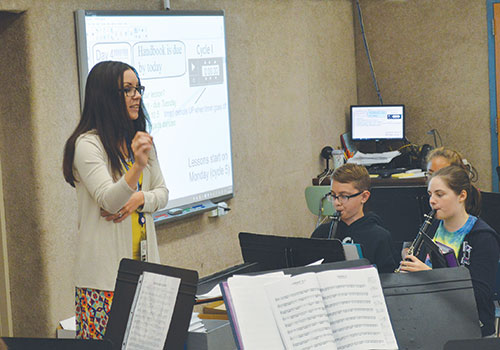Dear Younger Me:
You are about to embark on an exciting journey as you begin as a music education major. Allow me to give you a few pieces of advice.
What you learn in the classroom is important, but the connections and friends you make outside of the classroom may be even more important. The music world is small; the same classmates you have in college will be your colleagues later. They will be the people you reach out to when you cannot figure out why your third trumpet player cannot hit a top space E and you need suggestions.. They will be the people you reach out to when your budget has been cut, and you need new music but do not have your own resources to purchase it. They will be the people from the neighboring town you call when you have no one to chair the All-County band. Later on in your career, they may even be the people sitting across the table doing interviewing when you are trying to find that perfect job. These are important people.
Your professors are just as important. You need these people more than you realize, both during college and in the future. Your studio teacher, music education professors, and conductors will be references for future jobs and a source of advice in your first year when all other ideas have failed. They will be there to talk you off the ledge when you cannot find a job, or during the first year of teaching when you cannot seem to feel secure in your job. Even 10 or 15 years later you will still be emailing them to ask for revisions on an article for publication, share good news, or seek advice.
Take advantage of the classes your college has to offer. Do not just take the minimum. Take extra piano classes. The skills learned here may come in handy when your first job is an elementary general music job that also has band lessons, but instead of playing your main or even secondary instrument, they want you to model your piano reading skills.
Take every instrument repair class you can find. As an instrumental teacher, you will be repairing instruments on the fly, often three seconds before you walk onto stage for the concert – and sometimes on stage during the concert.
Even the classes you hate and the conductors you dislike have something to offer. Sometimes the best way to learn is to learn what not to do.
Join national, state, and county professional organizations. Subscribe to publications. It is fine to let them sit in a pile during the school year. You might look through them over the summer, or seven years after you get the magazine. The periodicals contain important pieces of information. If you look through them now, rip out the articles that are helpful, put them in a binder, and keep it. You will be glad to have these when you need them – and you will.
Take student teaching seriously. If your cooperating teacher comes in at 6:00 a.m., be there to walk into the building with. If he stays until 9:00 p.m., so should you. You are there to be a shadow and absorb all of the information they have to share. You may have the perfect placement or the worst, but either way you will learn a great deal, including what you like to teach, what you struggle to teach, and what you want to teach later on. Incidentally, once you discover something you struggle to teach, spend more time on it.
Once you graduate and find your first job, take a breath and have patience. Rome wasn’t built in a day; it was laid brick by brick with precision and patience. Similarly, you do not need to accomplish everything in your first year of teaching, or even in your first five years of teaching. Understand that there are many colleagues who have been there much longer than you. Listen to them tell you the history of the program and why things are the way they are. Be respectful to all the work that they have done before you started teaching there.
As you go through your first year, take time for yourself. Go home without work sometimes. Work will still be there, but the relationships and connections in your personal life are important. These are the people that will support you in good times and bad. They will be there when you get a pink slip for the fifth time. They, along with your mentors, colleagues, old college friends, and professors talk you off a ledge when you feel like you want to change your career. They are important. Treat them that way.
Allow yourself as a first-, second-, or even tenth-year teacher to be vulnerable. Ask colleagues to come into your classroom and give you advice and criticism. Do not be afraid to hear critiques; this is how we grow as teachers and ensemble directors. Hearing from a colleague that there are things to fix does not mean you are a bad teacher, it means there is a clear path toward becoming a better teacher. Use recording devices and send recordings to your college friends or any other music teacher who will listen.
Volunteer often at music events. Help in the scoring room at solo and ensemble contests (if it is allowed in your area). Volunteer to chair All-County ensembles. When a volunteer is needed do not look down, trying not to make eye contact. Others volunteered to give your students opportunities; volunteer so you can give your students and other students opportunities!
Have fun. Have fun learning and growing as a musician. Remember, music is your passion.







